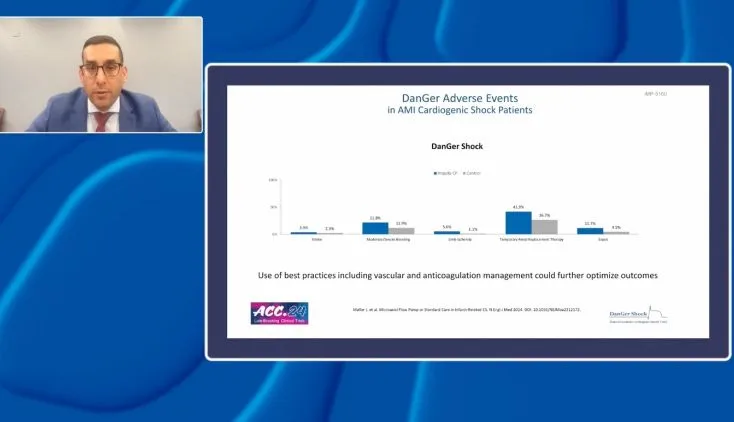Clinical Research & Data, Complete Revascularization, Escalation Therapy, AMI Cardiogenic Shock
Thursday Night Live: How DanGer Shock Validated our Heart Team
A multidisciplinary team of physicians from Hackensack University Medical Center (HUMC) discuss their cardiogenic shock team and protocols. Aditya Bharadwaj, M.D., sets the stage for the HUMC shock team by reviewing results from the DanGer Shock randomized controlled trial (RCT), a meta-analysis of RCTs of mechanical circulatory support (MCS) devices, and insights from the Cardiogenic Shock Working Group (CSWG).
Dr. Bharadwaj then introduces the cardiogenic shock team from HUMC: David Landers, M.D., acting director of cardiology; Haroon Faraz, M.D., director of interventional cardiology; Mark Anderson, M.D., chairman of the department of cardiac surgery and Kanika Mody, M.D., medical director of pVAD services and an advanced heart failure specialist.
Dr. Landers talks about the challenges of caring for cardiogenic shock patients after Impella insertion and the need for an algorithm of care and a multidisciplinary heart team. He discusses the importance of reviewing data with the team and adjusting and adapting the protocol as needed. He highlights that the shock program was key to reducing cardiogenic shock mortality at HUMC from 59% in 2018 to 32% in 2023.
Dr. Faraz presents a patient case illustrating shock team decision making with escalation from Impella CP® (partial support) to Impella 5.5® (complete support). He discusses the concepts of unloading before PCI, addressing Impella complications, and complete vs culprit lesion PCI. He highlights that “time is muscle” and the importance of unloading to reverse hemodynamic shock before it becomes hemometabolic shock.
Dr. Anderson discusses the beneficial effects of escalating Impella support and increasing ventricular unloading, which stimulates protective pathways and enhances the process of native heart recovery. He presents a clinical case of escalation to Impella 5.5 in a patient with acute myocardial infarction (AMI) cardiogenic shock and emphasizes that early intervention improves outcomes in cardiogenic shock.
Dr. Mody describes the role of pVAD services at HUMC and the algorithm for introducing guideline-directed medical therapy (GDMT) and weaning Impella support. She presents data from the first 152 patients with cardiogenic shock who were supported with Impella 5.5 at HUMC between 2019 and 2023. She highlights that 74 of the 152 patients had native heart recovery and 44 of those 74 patients—59%--were alive at one year without advanced therapies and with a mean ejection fraction of 49%.
Dr. Bharadwaj concludes the discussion with a Q&A session with the team addressing how to get surgeons to participate in shock teams, when to initiate temporary renal replacement therapy, the role of complete revascularization and accountability to protocols.
Dr. Bharadwaj, Dr. Landers, Dr. Faraz, Dr. Anderson and Dr. Mody are compensated by and presenting on behalf of Abiomed, and must present information in accordance with applicable regulatory requirements. This video includes Dr. Bharadwaj, Dr. Landers, Dr. Faraz, Dr. Anderson and Dr. Mody's opinions and findings based on their own knowledge and experience.
IMP-6529


